- Home
- Hanif Kureishi
Love + Hate: Stories and Essays Page 2
Love + Hate: Stories and Essays Read online
Page 2
As he chewed, even as the taste rose in his throat, he noticed an old woman from the back of the plane wobbling up the aisle. He supposed she wanted to use the toilet, but she stopped at his seat, repositioned and plumped his cushion and then flapped his scratchy blanket. She was about to sit in his seat. The Business section was full, other passengers, following the huge man’s revolt, having come up from the rear of the plane.
He hurried to his place, slipping in sideways under her arm just before she could sit down, whispering, ‘So sorry, but I have a bad back,’ as she attacked him in a language he couldn’t understand. He didn’t dare look at the disappointed woman for fear he would be shamed, but instead stared miserably out of the window until she stopped begging him. This seat, he thought, is the last thing I have and I’m staying here.
He leaned over towards the woman with the little dog. She was muttering, ‘Find me, find me, find me,’ and he gave her a small part of the roll, which she pushed into the gobbling mouth of the dog. ‘Thank you.’
Night came for the second time. Daniel walked a little, but never went beyond the area of his seat for fear that someone would steal it. The law, or even decency, no longer applied in this exceptional zone. He urinated in empty water bottles and rolled them behind his seat; he shat in sick bags and tossed them into the toilet. Excrement and urine were seeping down the aisles; the air was fetid, breathing an agony. He yearned for a breeze. He was surprised by how quickly things had deteriorated, and what a thin membrane it was that kept civilisation and hell apart.
Time passed as it does, until in the middle of the night there was some interest when the captain, flanked by a haggard steward for security, left his cockpit once more to stretch his legs and attempt some yoga positions. Both his and the steward’s uniforms were filthy. At the start of this catastrophe, the passengers had looked to the pilot with hope and expectation, considering him to have special knowledge of how things worked up here. He murmured a few words. ‘We’re working on it. We’re trying our damned best – you can be sure everyone in the company is working day and night to get us out of here. As it is, we’re perfectly safe, if a little uncomfortable. Please stay in your seats, be patient and we’ll get you down.’
At the sight of him, the passengers had hastened to the front in a crowd to hear. But when they saw the captain’s ashen face they didn’t listen for a minute before yelling, ‘You know nothing, you asshole. Why are you lying? You’re a disgusting idiot, a total fool, scum,’ and so on, until he scuttled back to his cabin and locked the door.
Since the captain had little to say, many realistic and fantastical explanations went round the plane. The city had broken down irrevocably, its cyber-system destroyed and thousands of people killed; the plane been ‘kidnapped’ by terrorists and the passengers were being used in secret negotiations – some of them would be exchanged for prisoners from elsewhere; the Earth had been partly destroyed by an asteroid. Their lot was ‘fate’, he heard often; it was ‘God’s will’ was the most tiresome of all. He thought, What a lot of jabber tragedy provides an excuse for. His view – that they were hanging from the spittle of a giant lizard – would not have been popular.
Many thought they were done for. They had flown through a storm; the plane had been flung about in the void; lightning flashed around them. Daniel was sick several times, though there was nothing in his stomach. He had no idea how the other passengers were able to make such terrible noises. People called out, ‘Please shut up!’ but it made no difference.
He was lying semi-comatose, neither asleep nor awake, when he heard other noises. Getting to his feet he saw that a blanket had been pinned up around the footballer’s seat. The footballer was the one person on the plane who didn’t complain or speak, but now he was copulating. Daniel moved enough to see that it was Bridget he was copulating with. Their pushing and thrashing brought down the blanket, and Daniel saw Bridget’s breasts were exposed and the man had pulled his trousers down to his knees. What a story this would be for the kids when Daniel got home.
Bridget got up and returned to the galley. Daniel closed his eyes but the footballer was standing over him. ‘Hey,’ he said. ‘Were you watching me?’
‘Watching what?’ said Daniel.
‘Don’t do that again,’ said the footballer. He reached out and took Daniel by the throat. ‘Do you have any water?’
‘I have just a little left.’
‘Give it.’
Daniel found his bottle concealed under his seat cushion and gave it to the midfielder. The footballer finished the water, crushed the bottle and handed it back.
‘If you come across any more, bring it to me.’
‘Yes,’ said Daniel, thinking, I won’t be found at the bottom of the sea holding hands with you. It wasn’t the right time to ask for a selfie.
He sat in his seat with a soiled blanket around him for some time, before venturing, cowed and hunched, into the galley, where he was surprised to discover that he now had the aspect of a street beggar. ‘Please, Bridget, is there anything else to eat? That’s all I need to know. You can tell me. Please whisper. Have you found anything at all?’
She shook her head. ‘Up here we’re out of everything, including water. But we should be down soon.’
‘How do you know?’ he asked.
‘I feel it,’ she said.
‘Thank you,’ he said, adding, ‘Don’t forget me if you find anything.’
As they continued the infinite repetition for hours in the darkness there were many hubbubs, howlings and disputes, over things like the little alcohol that was left, apples, and whose turn it was to lie on the floor and who could attempt to exercise in the restricted space. There was even a vicious fight when a woman grabbed the hair of another woman and tried to smash her face into the fuselage. Daniel had wondered whether someone should attempt to introduce some civility or even democracy into this non-space and non-time. Nevertheless, apart from the morose footballer, everyone did address everyone else, and there was a minimal element of organisation. A couple from the back of the plane brought food for the baby – and so did others – which the parents accepted gratefully, as the woman had stood up several times to scream, ‘My child will die – he’ll die!’
The despair and lassitude was general – the dog was curled up in the dog woman’s footrest, completely still; the footballer removed his cap to bang his forehead repeatedly on the back of the seat in front of him – but anything involving the huge man was dramatic. If he had appeared cussed at the start of the trip, by now he was impossible. He had been telling everyone around him that the situation was ‘too much’ and he had ‘had enough’. This would have crossed the minds of many people on the flight. If the world had somehow disappeared, while they were eternal, suicide was a nice thought to have in the circumstances.
It was nearly morning when the huge man stabbed himself in the chest with a cutlery knife and didn’t make an entirely triumphant job of it: the knife needed to go several more inches into the body. Joining the crowd around the man, Daniel saw him sitting there with his mouth open and the erect blade sticking out of him. It would take some time, but he would bleed to death. At that moment the huge man was attempting to get to his feet and – even in his condition – began to stagger towards the back of the plane, declaring, ‘I’m getting out of here.’
‘Good luck!’ someone shouted. ‘Shut the door behind you!’
‘Hold the door!’ yelled someone else. ‘I’m coming too!’
As he turned away from the man, Daniel stumbled and almost collapsed into the detritus on the floor. He had become so used to the calm trajectory of the unanchored, ever-turning plane that he was surprised to feel it roll and rise. He sat down and opened the blind. It was early afternoon and they seemed to be heading into the city again. The engines accelerated. Surely they would land soon. They had suffered, but all would be well; he would run from the plane and walk on the earth again. He would be glad to see everyone; they might even be relieved
to see him. What a lesson in love this had been.
The plane banked, and rose. It seemed to have intention now. There was a moment of blinding sunlight, and he covered his eyes. When it straightened and he looked down again, he saw the suburbs with a motorway running through them; the traffic was moving smoothly. The plane followed this road until Daniel could see fields. It wasn’t long before they reached the coast. Briefly there was a beach with what looked like insects crossing it, and soon they were heading out to sea.
They were moving away from the Earth. He thought he understood it now. There was some disorder in the world they had to leave behind. As something appeared to be happening and he felt he was sitting with his feet in damp mould, he decided it was time to put his shoes on. He would be prepared. Turning one shoe over, he found a small stone within the corrugation of the sole. He extracted it and weighed it, looking at it in the open cup of his hand. It was round like the earth and smooth as a pearl.
Anarchy and the Imagination
Ever since I was a teenager I’ve collected ‘How to’ books about writing. I have a shelf of them, and recently I was looking at some material about plot, structure and narrative, the technical part of writing, thinking I might pick up something new. There are courses about this stuff everywhere all the time, and, as writing teachers, there are questions we are asked constantly: about the ‘arc’ and the ‘journey’, or ‘How do you make the structure work?’ ‘What is good dialogue?’ These are boring questions, and the answers are boring. The teacher and the student are enacting their roles perfectly, keeping everything nicely mundane, only talking about things which can be taught, or maybe learned. Through being mortified like this, the whole question of art then seems manageable, though. But obviously the most important element is missing.
If you think of the real thing – of, say, Mary Shelley’s Frankenstein, or Stevenson’s Jekyll and Hyde, or Wilde’s Dorian Gray, or perhaps Cheever’s great story ‘The Swimmer’, or Kafka’s ‘The Metamorphosis’, or any of the work of Carver or a poet, such as Plath – you have to begin to think about the wild implausibility, boldness and brilliance of the artist’s idea or metaphor rather than the arrangement of paragraphs. Once you start thinking about this you have to think about the imagination and how it works, of where it might come from, and where it might take you. You’re in useful trouble.
Most people have good ideas all the time, they just prefer not to notice them. Yet the authors just mentioned found solutions to conflicts which were bothering or even tormenting them, conflicts which must have seemed like holes or impossibilities at the time, and which eventually demanded a creative leap into a new way of seeing. Their imaginations were transformative, a going beyond, requiring that a new thing be made out of old things, which were then put together in shocking and disruptive combinations which are fresh even today.
It could easily be the case that unbearable conflict might produce depression or self-hatred. You could call depression ‘a failure of the imagination’, a self-sabotaging refusal to consider a creative solution or look forward. Such conflicts might also produce art, the work itself representing the ‘impossibility’. In Franz Kafka’s masterpiece ‘The Metamorphosis’, the protagonist, Gregor Samsa, wakes up one morning to find he has turned into a dung beetle. This illustrates, amongst many other things, Kafka’s relation to his own family, showing an imaginative flight from his own personal impasse, and how an altruistic sacrifice might benefit the whole family. Kafka was thinking about the emergency of his life. He couldn’t talk about it, and he couldn’t not talk about it. He couldn’t change his life, either; he was too masochistic for that; he just wrote. Being truly transgressive, when it comes to our own rules, is one of the most difficult things there is. However, Kafka’s internal editor made him inventive; his crisis provoked a metaphor, and he wrote a story, putting the malady in the reader, so that it might change our lives. Kafka found a beautiful compromise – at least from the point of view of literary history.
Romantics such as Wordsworth and Coleridge knew that the imagination is as dangerous as dynamite, not only politically – the populace might have new, important, if dissident, ideas – but also inside an individual. The imagination can feel like disorder, when it is, in fact, an illumination. There is no doubt that the imagination is hazardous, and should be; there are certain thoughts which are combustible, and must be repressed or foreclosed. Good and evil, as in a bad film, must be kept separate. There are notions here which cannot be fully conceived of or thought, which must not be put together, which cannot fuse, develop or seem ambiguous. That is because like dreaming, the imagination can be antisocial. Plato would have banned art from his ideal state because it was fake, or ‘an imitation’, as he put it, and might over-stimulate the populace. And we know, of course, that writers and artists throughout history have been attacked, censored and jailed, for having thoughts or ideas which other people cannot bear to hear. From this point of view, the Word is always risky. So it should be.
The imagination rarely behaves well. It can be ignored and censored, but never entirely willed away. Such a willing away would be a mistake because, unlike fantasy, which is inert and unchanging – in fantasy we tend to see the same things repeatedly – the imagination represents hope, rebirth and a new way of being. If fantasy is a return of the already-known and familiar, you might say that an inspiration is a suddenly uncovered part of the self, something newly seen or understood. Emerson, who tells us in ‘Compensation’ that ‘growth comes by shocks’, writes, in another essay, ‘Nature’, ‘The best moments of life are these delicious awakenings of the higher powers.’
One of my students said he read books in order to have ‘more ideas about life’. You’d have to say that the imagination is an essential faculty, and that it can be developed and followed. It is as necessary as love because without it we are trapped in the bleak polarities of either/or, in a North Korea of the mind, deadly and empty, with not much to look at. Without imagination we cannot reconceive what we know, or see far enough. The imagination, while struggling with inhibition, represents more thought and possibility; it is myriad, complex, liquid, wild and erotic. Art defamiliarises, and so does the imagination. The banal world seems strange again. It opens in new ways.
The imagination is not only an instrument of art. We cannot delegate speculation to artists. It isn’t only artists who put difficult things together, make things up, and require and utilise vision. Whether we like it or not, we are all condemned to be artists. We are the creators and artists of our own lives, of the future and of the past – of whether, for instance, we view the past as a corpse, a resource, or something else. We are artists in the way we see, interpret and construct the world. We are daily artists, of play, conversation, walks, food, friendship, sex and love. Every kiss, every piece of work or meal, every exchanged word and every heard thing – there are better ways of listening – has some art in it, or none.
To survive successfully in the world requires huge capability. And to be bold and original is difficult labour; it can seem impossible, because we have histories and characters that can become fixed identities. We are made before we know it; we are held back by who we were made into. Not only that, we are inhabited by destructive, chattering devils who want less than the best for us. It is a struggle to live freely; identities become halted. Internalised, irrelevant versions of the law and custom limit us; there’s nothing as dangerous as safety, keeping us from reinvention and recreation. Imaginative work can seem destructive, and might annihilate that to which we are most attached. Naturally, if we can do this, we pay for our pleasures in guilt. However, in the end, misery and despair are more expensive, and make us ill. Let madness be our guide, but not our destination.
Aspiring writers who wish to be taught plot, structure and narrative are not mistaken, but following rules doesn’t make anyone an artist. The rules produce only obedience and mediocrity. The artist asks questions about moral authority itself. ‘Structure’, for the artis
t, is imagination.
Great writing and great ideas are strange: their sorcery and magic are more like dreaming with intent than descriptions of the world. Daily art makes and remakes the world, giving it meaning and substance. It’s a responsibility. You could lose your voice, you could write ‘I Am the Walrus’, or you could throw a party. The imagination creates reality rather than imitates it. There is no interesting consensus about the way the world is. In the end, there is nothing out there but what we make of it, and whether we make more or less of it is a daily question about how we want to live and who we want to be.
The Racer
He and his wife had joked, for several years, about having a race around the streets where they lived. Now, in the week of their divorce, before they moved out of the house they’d shared with the children and stepchildren for twelve years, they would do it, neither of them having been able to find a reason to back down. It would, he guessed, be the last thing they did together.
He’d jogged twice a week for the past five years, but had rarely managed more than twenty minutes. And while she practised yoga and liked to dance the bossa nova, she took no other exercise. She had the racing edge, though, being in her mid-forties, while he was in his early sixties, which, he had discovered, was an uncomfortable age of earnest and critical self-reflection.
Compared to him, his rival wasn’t in bad shape, but she couldn’t be said to be in good shape. In her teenage years she had been a cross-country runner. She was built for it: tall but chubby, with strong, thick legs. She would be very determined, he knew that. Nonetheless, he didn’t believe she had sufficient stamina. You couldn’t just run for over an hour at a hard pace if you hadn’t done it for twenty-five years. Or could you, if bitterness was your fuel? She had said, when they discussed it, that she could ‘never, ever’ let him beat her. She would rather kill herself. Let her die then, he thought. He’d bury her gladly.

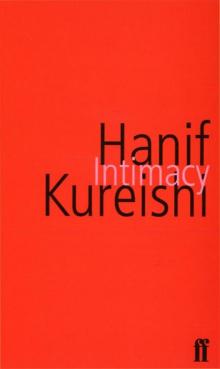 Intimacy
Intimacy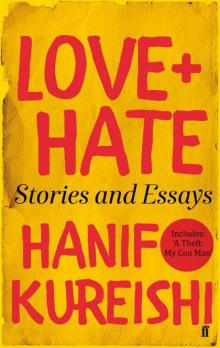 Love + Hate: Stories and Essays
Love + Hate: Stories and Essays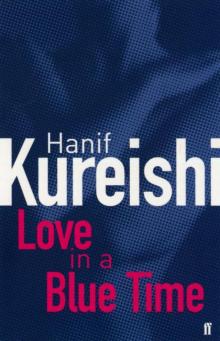 Love in a Blue Time
Love in a Blue Time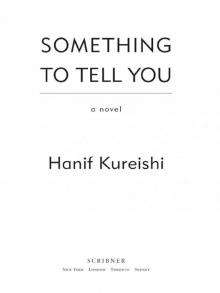 Something to Tell You
Something to Tell You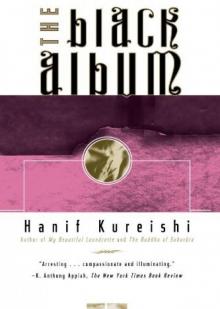 The Black Album
The Black Album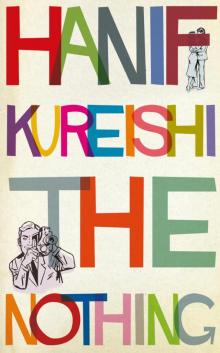 The Nothing
The Nothing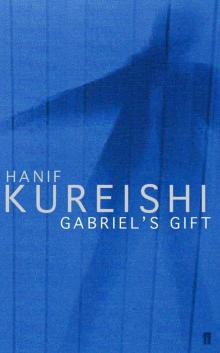 Gabriel's Gift
Gabriel's Gift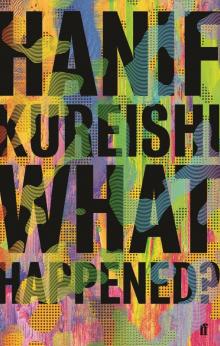 What Happened?
What Happened? Midnight All Day
Midnight All Day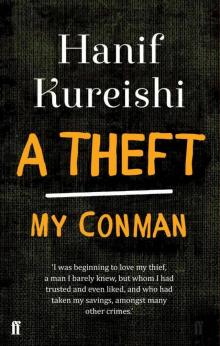 A Theft: My Con Man
A Theft: My Con Man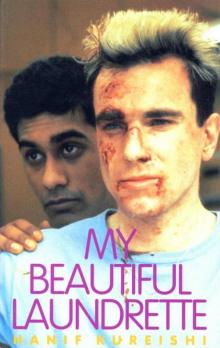 My Beautiful Launderette
My Beautiful Launderette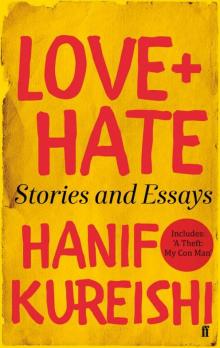 Love + Hate
Love + Hate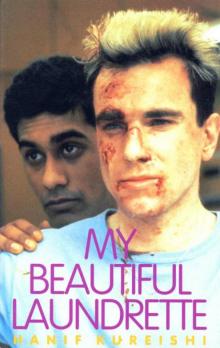 My Beautiful Laundrette
My Beautiful Laundrette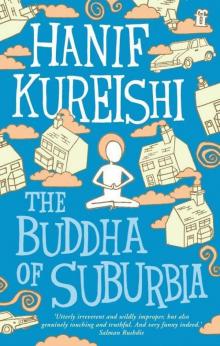 The Buddha of Suburbia
The Buddha of Suburbia